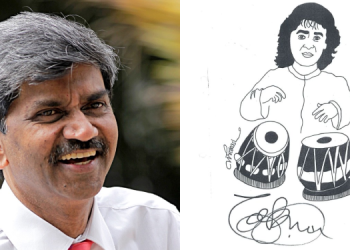The Kerala High Court has called for caution against movie reviews from anonymous sources and directed concerned authorities to take necessary measures under the Information Technology Act (IT Act). The court made the remarks while considering a petition filed by the director of ‘Aromalinte Adyathe Pranayam’.
The 2022 Hindi movie, ‘Chup: Revenge of the Artist’ directed by R Balki with Dulquer Salman in the lead dealt with the topic of dishonest movie reviews.
‘Review bombing’ has become a burning issue in the film industry. Filmmakers are blaming YouTube reviews for the failure of movies at the box office. There has been a surge in YouTube channels, especially movie related ones. Reportedly, in 2021, YouTube’s creator economy contributed a significant Rs 10,000 crores to India’s GDP and generated 7.5 million new job opportunities. At the same time, there is a hue and cry from the film industry against certain sections of YouTubers alleging that they are purposely degrading the movies and indulging in personal attacks against the actors or the individuals involved in the movie, without even watching them, or with vested interests.
A few days back, Kochi City Police registered the first ever case against online film reviewers related to review bombing. The action was prompted by the complaint by the director of the movie ‘Rahel MakanKora’ where he alleged that deliberate attempts were done to degrade his movie on social media platforms.
A Kerala High Court on October 25 called for a close watch on social media platforms to ensure that that anonymous and mala fide reviews of films are not allowed to be circulated online. There is a call for regulation on online film reviews from the makers.

“Movie reviews were always there, even before the popularity of YouTube. Television channels used to do movie reviews. The movie associations are against the reviews which are affecting the film industry. We wholeheartedly accept honest and genuine reviews, where they speak about the negatives and positives of the movie. The problem is of late, movie reviews have become a career option for a section of people, especially the youth which has happened over the last three to four years. There is a section of so-called movie reviewers who garner views and subscribers with the kind of language, sarcasm, and slangs they use. Also, there is this particular personality trait in our society where people tend to like those who are critical of everything; they are present in all movie industries. Hence, when a particular movie reviewer comes up with this kind of review, then the chances are high that they will be well received and have a huge following,” said Vijay Babu, Film Producer.
He added, “Once they started becoming aware of the YouTube revenue stream, again a section of youth thinks that if they say normal or good things about the movie nobody will be interested in viewing their channel. This is the problem the film industry is facing. There are review bombings in Bollywood and other industries as well, but that happens only with the big-ticket movies. It is a trend in Malayalam that every movie that are releasing is getting reviewed by the YouTubers.”
Is regulation of online reviews practically possible?

“Freedom of expression and speech is fundamental, and movie reviews are the most innocuous form of expression online. Many movies get very poor reviews by audiences, who are just expressing their opinion on the movie. Unless there is definitive proof about such negative reviews being targeted with some malicious intent, like review bombing by vested interests, this may not stand the test of higher courts. However, most reviewers may not want to go to the higher courts to maintain their right to review. The High Court judgement may be a deterrent in this case, but it is unlikely to hold stead in the larger view of things,” said N Chandramouli, CEO at TRA Research.

According to Rajeev Balakrishnan, Director at Kaizzen PR, the regulation of online reviews is next to impossible unless there is an act passed by the government to do so.
“Today every viewer feels empowered to post his or her review on social media or instagram. If truth be told, this has also led to many of these reviewers demanding cash/ gifts/ sponsors for a favourable report on their YouTube channels. If it is a big-ticket film like Leo which has fetched a million views or more for its trailers then one can be sure that the reviewers are already sharpening their knives. They make a livelihood now out of this format,” he added.
How does one identify a paid or motivated review bombing?
“There are times when vested interests may want to post negative reviews on purpose, and this can affect movies and their financial outcomes. It has been done by political parties also in case the movie has a politically motivated statement. Sometimes the gain sought is publicity, and in some cases also money. Most cases that I am aware of employ strong PR to ensure that such negativity is reduced, if not nullified. However, it is very difficult to identify the fact that a review is motivated or paid for,” said Chandramouli.
Balakrishnan is of the opinion that it is difficult to identify a paid or motivated review bombing in the current scenario because they are not registered as a collective body but as individuals and each of them are within their fundamental rights as long as they do not cross the line of personal defamation.
“The sad truth is sometimes it’s a rival actor’s fan club that is at the root of this venomous attack. Unless stricter laws or licences are issued for those who can review the films, this trend is unlikely to change,” he added.

“The issue has a lot of subjective elements to it. One cannot generalise all the reviews, there will be personal bias in every review,” observes G. Dhananjayan, Film Producer.
He reasons that the police should be able to identify if there is mala fide intention behind the movie review, adding that it is a grey area where objective definitions will provide difficult.
“All the producers are waiting for clarity on the judgement which is yet to come. The Kerala police have started filing cases against those who are found to do review with mala fide intentions. You can identify a genuine reviewer if they have a regular blog or are working for a reputed company or they have a genuine track record. At the same time, how the petitioner is able to establish the motive behind the review bombing is something which we are waiting and watching. It might be difficult, but I hope that a proper guideline will be provided soon. The movie reviews should talk about the movie, its technical aspects, what are the elements that worked and did not work in the film. They need to say what could have been done better; the movie reviews shouldn’t become personal attacks. If there are regulations coming in, it should be able to differentiate between a proper professional review and personal mala fide attack,” he said.
“We don’t have any problem with the reviews as it is an individual’s basic right. The only request or opinion is can’t they wait for three days to do the movie review? Not every movie is everyone’s cup of tea, every movie has a primary audience and secondary audience. We market movies targeting at the primary audience because only they give positive reviews for the movie in many forms including word of mouth. Only then will the secondary audience watch it. The producers are only saying wait for at least three days. It’s about co-existence; the reviewers will exist only if films are getting releases. Recently a film producer has taken a verdict from the court that reviews shouldn’t be done for his movie whether it is positive or negative. It is an interesting verdict; anyways we are spending a lot of money on the movie production and promotion, so why not file a similar petition? I have taken a legal opinion on the same; currently I am in wait and watch mode,” concluded Vijay Babu.
Feedback: [email protected]

















